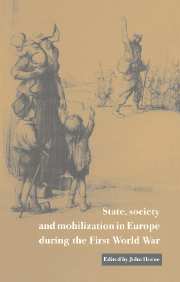Book contents
- Frontmatter
- Contents
- List of contributors
- Preface
- 1 Introduction: mobilizing for ‘total war’, 1914–1918
- I National ideals
- II Solidarities and minorities
- III Army and nation
- IV The limits and consequences of mobilization
- 12 Remobilizing for ‘total war’: France and Britain, 1917–1918
- 13 Mobilization and demobilization in Germany, 1916–1919
- 14 The Italian experience of ‘total’ mobilization, 1915–1920
- Notes
- Index
12 - Remobilizing for ‘total war’: France and Britain, 1917–1918
Published online by Cambridge University Press: 04 December 2009
- Frontmatter
- Contents
- List of contributors
- Preface
- 1 Introduction: mobilizing for ‘total war’, 1914–1918
- I National ideals
- II Solidarities and minorities
- III Army and nation
- IV The limits and consequences of mobilization
- 12 Remobilizing for ‘total war’: France and Britain, 1917–1918
- 13 Mobilization and demobilization in Germany, 1916–1919
- 14 The Italian experience of ‘total’ mobilization, 1915–1920
- Notes
- Index
Summary
When war broke out in 1914, civil liberties were curtailed and the arbitrary powers of the state were dramatically increased in France and Britain, as in other belligerents. The imposition of military discipline on millions of men completed a huge expansion of the state's repressive capability. Yet the legitimacy of both state and nation in the pre-war period had come increasingly to depend on mass participation, however incomplete, and this was especially true of Britain and France as something approaching democracies. Since the war was immediately held to be a matter of survival for each nation and state, mobilizing the energies of society behind it naturally drew on the broader legitimacy of both. It was a process which could not rely on repression, or even on the state, but entailed the ‘self-mobilization’ of civil society in the form of a host of semi-official and private agencies. Support for the national effort, especially in the liberal democracies, came from persuasion – and self-persuasion – much more than from coercion.
The crisis of home-front morale which afflicted both France and Britain in 1917 challenged this mobilization process. The interminable war of attrition produced currents of war-weariness which labour and pacifist minorities threatened to radicalize. The consensus on continuing the war until outright victory had been achieved could no longer be taken for granted. The issue of how, and on what terms, to end the conflict re-politicized the war effort and shattered the political truce more decisively than any earlier quarrels over the conduct of the war.
- Type
- Chapter
- Information
- Publisher: Cambridge University PressPrint publication year: 1997
- 1
- Cited by



